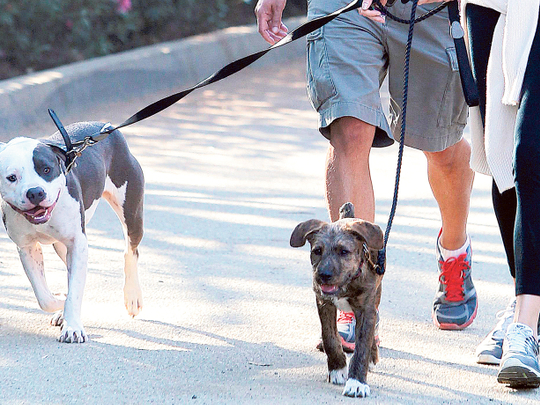
Dubai: Dubai dog owners are being urged to vaccinate their dogs against the Parvovirus infection (Parvo) after eight cases were confirmed at the British Veterinary Hospital.
The hospital reported over 40 dog owners who have called in the past two weeks worried about their pets displaying symptoms of the virus. Dog owners have also expressed panic over the presence of the virus in the UAE on social media channels.
Parvo is one of the most prevalent diseases for canines and one of the most deadly, said Dr Sarah Elliott, veterinary director at the hospital. It is a highly contagious viral disease that attacks the intestinal tract, white blood cells and, occasionally, the heart.
“More than 90 per cent of the puppies that get infected with parvovirus will die if they are not treated in time,” said Dr Elliott.
Dr Elliott pointed out that large numbers of pets in Dubai have shown symptoms of canine killer viruses, and dogs stand a high chance of catching the Pravo virus if not vaccinated properly.
“Seeing puppies and dogs die of these diseases is particularly frustrating since they are both preventable through vaccinations. A puppy can receive its first vaccination at six weeks of age, with boosters at three-week intervals until it is 16-18 weeks old, then annual boosters,” she said.
Dr Elliott also reported three cases of another virus known as distemper present at the hospital, and said the frequency of cases is increasing rapidly. “Both viruses are spread in a similar form, and are transmitted by faecal waste or vomit from infected dogs,” she said.
The distemper virus manifests as a different disease and the symptoms can range from runny eyes and nose with cough through to diarrhoea, vomiting and neurological signs, including seizures and death, explained Dr Elliott.
Referring to the reported cases, and growing concern among dog owners, Dr Hashem Al Awadhi, Head of Veterinarian Services at Dubai Municipality, said the municipality makes routine inspections of all facilities selling pets to ensure they are abiding by regulations and that none of the animals are sick.
“We urge people to vaccinate their pets to prevent them from contracting diseases, such as the parvo virus, which can be easily prevented,” he said.
The municipality also has programmes to control stray dogs and cats, as they can spread diseases.
Dr Loay Abdul Rahman, Principal Veterinarian Specialist at Dubai Municipality’s Veterinarian Services, said they have 6,000 dogs registered in their ‘Aleef’ animal database, and that these eight cases reported by the British Veterinarian Hospital are the only confirmed cases in the city.
“Eight cases out of 6,000 is a very small ratio, and the disease is easily preventable through vaccination and by following the correct hygienic practices,” he said.
He explained that the municipality has a system to monitor all animal diseases in order to ensure public health.
The parvo virus, he said, only affects dogs and is not communicable to humans. “It leads to the death of small puppies, and we see it mostly in young imported puppies. People should only buy pets from trusted outlets and vaccinate them, and follow proper hygienic practices to avoid similar diseases.” Abdul Rahman said.
Symptoms
Common symptoms of parvo disease include repeated vomiting, projectile, blood and diarrhoea, as well as depression, loss of appetite and lethargy.
The virus can attack dogs of any age, but it is most often seen in dogs under one year old. Puppies between 6 and 24 weeks are the most susceptible, and suffer shock-like deaths in as little as 48 hours after onset. Older dogs have a better survival rate, but can still fall miserably ill, said Dr Elliott.
If a dog is diagnosed with the virus, incubation periods can be up to 12 days after exposure. If not treated, an infected dog may dehydrate rapidly due to loss of body fluids, which could lead to death within 48 to 72 hours after symptoms start.
“Parvo is found wherever dogs congregate, including parks, playgrounds, shelters, breeding and boarding kennels and dog shows and can be carried on the hair or feet of infected dogs, or on contaminated cages, shoes, or other objects,” she said.
The spread of the virus in the UAE is due to two reasons. “One is the cooler weather in the winter months, which helps the virus spread, versus the hot summers where the infection is killed by the high temperatures. The second is imported puppies who have no vaccination records or fake paperwork, falsifying the number and types of vaccinations done in order to meet the country’s requirements,” explained Elliott.
Pointing out that the UAE authorities have done a sound job in checking pets’ documents on entry, Dr Elliott said puppies who are not vaccinated properly are bringing viruses into the environment.
“I would urge all dog owners to literally watch their pets being vaccinated and not take anyone else’s word for it. The hospital is ready to access vaccination cards and assist anyone who has doubts about their pet’s well-being,” she said. “If dogs are vaccinated once a year properly, then they are protected,” added Dr Elliott.
Points to remember
When you get a new puppy, remember:
Do not trust any vaccination record unless you have witnessed it done or can verify it completely with the named veterinary clinic.
Do not assume your puppy is protected until a week after it has completed its vaccination course.
During this period, do not take it to public areas where it may be at risk of exposure to disease.








